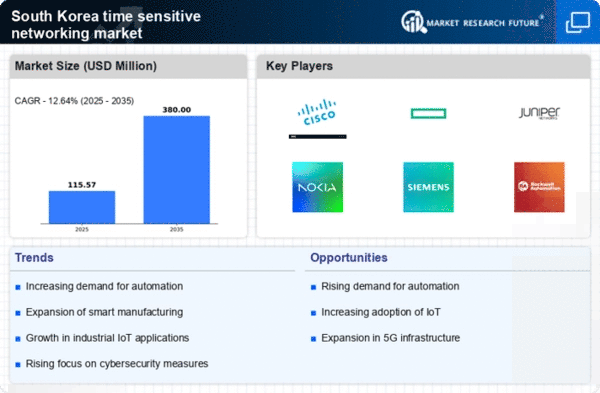Emergence of 5G Technology
The rollout of 5G technology in South Korea is poised to revolutionize the time sensitive-networking market. With its promise of ultra-low latency and high-speed connectivity, 5G enables a new era of applications that require instantaneous data transmission. Industries such as autonomous vehicles, remote surgery, and augmented reality are set to benefit significantly from this technological advancement. The South Korean government has invested heavily in 5G infrastructure, with projections indicating that the market for 5G-related services could reach $7 billion by 2025. This rapid adoption of 5G technology is likely to drive demand for time sensitive networking solutions, as organizations seek to leverage the capabilities of next-generation connectivity.
Advancements in Industrial Automation
The time sensitive-networking market is significantly influenced by advancements in industrial automation technologies. South Korea's manufacturing sector, known for its innovation, increasingly adopts automated systems that require reliable and fast communication networks. The integration of IoT devices and smart sensors necessitates a robust networking infrastructure to ensure real-time data exchange. Reports indicate that the automation market in South Korea is expected to reach $10 billion by 2026, with a substantial portion allocated to networking solutions. Consequently, the time sensitive-networking market plays a crucial role in supporting these automated processes, enabling manufacturers to enhance productivity and reduce operational costs.
Increased Focus on Cybersecurity Measures
As the time sensitive-networking market expands, the emphasis on cybersecurity measures becomes increasingly critical. With the rise of interconnected devices and systems, South Korean organizations face heightened risks of cyber threats. Consequently, there is a growing need for secure networking solutions that can protect sensitive data while ensuring low-latency communication. The cybersecurity market in South Korea is projected to grow at a CAGR of 12% over the next five years, reflecting the urgency for robust security protocols in networking infrastructures. This trend underscores the importance of integrating advanced security features within time sensitive networking solutions to safeguard against potential vulnerabilities.
Rising Demand for Real-Time Data Processing
The time sensitive-networking market in South Korea experiences a notable surge in demand for real-time data processing capabilities. Industries such as finance, healthcare, and manufacturing increasingly rely on instantaneous data transmission to enhance operational efficiency. For instance, the financial sector requires rapid transaction processing to maintain competitiveness, while healthcare systems depend on timely patient data for critical decision-making. This trend is reflected in the market's projected growth rate of approximately 15% annually, driven by the need for low-latency communication solutions. As organizations seek to optimize their processes, the time sensitive-networking market becomes essential in facilitating seamless data flow and improving overall productivity.
Government Initiatives for Smart City Development
Government initiatives aimed at developing smart cities in South Korea are propelling the time sensitive-networking market forward. The South Korean government has committed substantial investments to enhance urban infrastructure, focusing on connectivity and data-driven solutions. These initiatives include the deployment of smart traffic management systems and public safety networks, which rely heavily on time sensitive networking technologies. As part of this strategy, the government aims to improve urban living conditions and optimize resource management. The projected investment in smart city projects is estimated to exceed $5 billion by 2027, indicating a robust demand for time sensitive networking solutions to support these transformative efforts.
















